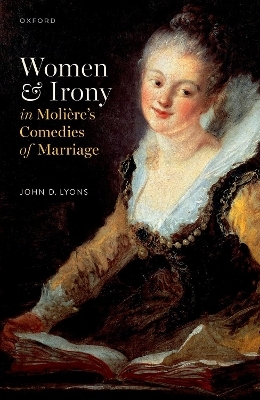
Women and Irony in Molière's Comedies of Marriage
Seiten
2023
Oxford University Press (Verlag)
978-0-19-888737-9 (ISBN)
Oxford University Press (Verlag)
978-0-19-888737-9 (ISBN)
Women in seventeenth century France enjoyed few rights, particularly regarding the choice of a husband. This book explores how Molière's comedies presented women using one of the few assets they had: their mastery of words, particularly the rhetoric of irony, to frustrate the plans of fathers, guardians, and other authority figures.
This is a book about how Molière, France's most celebrated author of comedies, made something strikingly new out of the traditional comedy plot of thwarted courtship. Though justly celebrated for his mastery of physical comedy and farce, one of Molière's key moves was to pay attention to the way women could use language. Seventeenth-century France was a time when speaking well became exceptionally important, and in this arena women were the trend-setters. Among the most important places to display taste and social skills were the salons, gatherings presided over by women. Yet women still enjoyed little in the way of rights, particularly regarding a central decision in their lives: the choice of a husband. French regulations of marriage contracts became increasingly restrictive, largely to the detriment of women. To draw attention to their plight, women novelists and essayists presented case studies in how men and women misunderstood one another, how women were coerced to wed, how marriages could become nightmares, and how courtships could fail. Against this fraught social background Molière showed women using one of the few assets they had, their mastery of words, and in particular the rhetoric of irony, to frustrate the plans of fathers, guardians, and other authority figures. The comedies discussed here include very well-known plays such as The Misanthrope, Tartuffe, The Learned Ladies, The School for Wives and Don Juan, and also less known but revealing and thought-provoking works such as The School for Husbands, George Dandin and Monsieur de Pourceaugnac.
This is a book about how Molière, France's most celebrated author of comedies, made something strikingly new out of the traditional comedy plot of thwarted courtship. Though justly celebrated for his mastery of physical comedy and farce, one of Molière's key moves was to pay attention to the way women could use language. Seventeenth-century France was a time when speaking well became exceptionally important, and in this arena women were the trend-setters. Among the most important places to display taste and social skills were the salons, gatherings presided over by women. Yet women still enjoyed little in the way of rights, particularly regarding a central decision in their lives: the choice of a husband. French regulations of marriage contracts became increasingly restrictive, largely to the detriment of women. To draw attention to their plight, women novelists and essayists presented case studies in how men and women misunderstood one another, how women were coerced to wed, how marriages could become nightmares, and how courtships could fail. Against this fraught social background Molière showed women using one of the few assets they had, their mastery of words, and in particular the rhetoric of irony, to frustrate the plans of fathers, guardians, and other authority figures. The comedies discussed here include very well-known plays such as The Misanthrope, Tartuffe, The Learned Ladies, The School for Wives and Don Juan, and also less known but revealing and thought-provoking works such as The School for Husbands, George Dandin and Monsieur de Pourceaugnac.
After his Ph.D. at Yale University, John Lyons taught French and Italian at Dartmouth College, where he also served as chair of the Comparative Literature Program. During part of that time he was also Director of the Centre Américain du Cinéma in Paris. In 1987 he joined the Department of French at the University of Virginia, becoming Commonwealth Professor in 1992. His research has been funded by the NEH, the J.S. Guggenheim Foundation, and the Mellon Foundation. In 2007 he was named Chevalier de la Légion d'Honneur.
| Erscheinungsdatum | 17.10.2023 |
|---|---|
| Zusatzinfo | One line drawing |
| Verlagsort | Oxford |
| Sprache | englisch |
| Maße | 159 x 240 mm |
| Gewicht | 540 g |
| Themenwelt | Kunst / Musik / Theater ► Theater / Ballett |
| Geisteswissenschaften ► Sprach- / Literaturwissenschaft ► Anglistik / Amerikanistik | |
| Geisteswissenschaften ► Sprach- / Literaturwissenschaft ► Literaturwissenschaft | |
| Sozialwissenschaften ► Soziologie ► Gender Studies | |
| ISBN-10 | 0-19-888737-X / 019888737X |
| ISBN-13 | 978-0-19-888737-9 / 9780198887379 |
| Zustand | Neuware |
| Informationen gemäß Produktsicherheitsverordnung (GPSR) | |
| Haben Sie eine Frage zum Produkt? |
Mehr entdecken
aus dem Bereich
aus dem Bereich
Poetik eines sozialen Urteils
Buch | Hardcover (2023)
De Gruyter (Verlag)
59,95 €
Buch | Softcover (2024)
belleville (Verlag)
20,00 €


